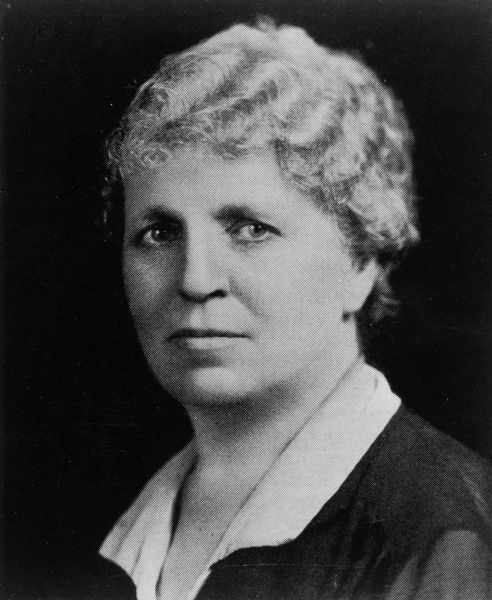Lutie Stearns - A Champion for Books and Readers
Born: September 13, 1866, St. Cloud, Wisconsin, U.S.A.
Died: December 25, 1943, Milwaukee, Wisconsin, U.S.A.
Lutie Eugenia Stearns was a pioneering librarian who believed books should be free and accessible to all, creating traveling libraries, fighting for children’s right to borrow books, and leading efforts in literacy, women’s rights, and community reform.
Stearns, born on September 13, 1866, in St. Cloud, Wisconsin, grew up believing that books had the power to change lives. When she was a young child, her family moved to Milwaukee, where she later graduated from the Milwaukee State Normal School in 1886. She began her career as a teacher, but soon found her true calling in libraries, a field where she would become a pioneer and reformer.
In 1888, Stearns joined the Milwaukee Public Library as part of the circulation department. She quickly rose to become superintendent of circulation and gained recognition for her organizational skills and passion for bringing books to the community. After the death of her mentor, Minnie M. Oakley, in 1895, Stearns stepped into leadership and deepened her work in expanding library services.
That same year, Stearns helped found the Wisconsin Free Library Commission, one of her most important achievements. She believed strongly that books should be free and available to all people, regardless of age, gender, or social standing. With her colleague Frank A. Hutchins, she worked with state senator James H. Stout to pass a law creating the Commission. Soon after, Stearns resigned from the Milwaukee Public Library to become the first paid staff member of the new organization.
Stearns then spent almost two decades traveling throughout Wisconsin, bringing books to towns, farms, schools, and even prisons. Between 1895 and 1914, she helped deliver nearly 1,400 traveling libraries across the state. Each collection was small, usually just a box of 25 to 30 books, but they provided opportunities for people in rural or isolated areas to read. Her work meant that thousands of people, many of whom had never had access to a library, could finally discover the joy of reading.
One of Stearns’s boldest moments came in 1894 when she stood before the American Library Association to argue that children under 12 should be allowed to borrow books. Despite a speech impediment that made public speaking difficult, she delivered her message clearly and powerfully. Her efforts helped change attitudes toward children’s literacy and opened the doors for young readers to be treated as full library patrons. She later published essays and reports on children’s reading, spreading her influence far beyond Wisconsin.
Stearns’s vision extended beyond libraries. She was a strong supporter of women’s rights and the suffrage movement, and she helped found the Wisconsin Federation of Women’s Clubs. She also encouraged women to form clubs across the nation as a way to learn, organize, and advocate for change. In addition, she served as a regent of Wisconsin’s state normal schools, furthering her dedication to education.
Even after stepping back from her library work in 1914, Stearns remained active as a lecturer, writer, and reformer. She wrote a weekly column for the Milwaukee Journal in the 1930s, continuing to inspire readers with her ideas. Her lifelong dedication to free access to books and education left a lasting mark not only on Wisconsin but on the entire library profession.
Her legacy has been recognized in many ways. In 1951, she was inducted into the American Library Association’s Hall of Fame. In 2008, she was among the first honored in the Wisconsin Library Hall of Fame. Perhaps her most enduring influence can be seen in the Little Free Library movement. Just as Stearns once delivered traveling boxes of books to rural Wisconsin, today’s Little Free Libraries share books in small boxes around the world. This global movement of “take a book, leave a book” exchanges echoes the same belief that guided Stearns’s life: that books should be shared freely and bring communities together.
Lutie Eugenia Stearns died in 1943, but her passion for literacy and equality continues to inspire. She showed remarkable courage by standing up for children, women, and underserved communities. Through her libraries, lectures, and activism, she proved that one determined person can bring the gift of reading to thousands. Her story reminds us that books are more than pages, they are bridges that connect people, ideas, and generations.
References:
Nix, Larry T. “Lutie Eugenia Stearns (1866-1943).” Wisconsin Library Heritage Center, 28 Jan. 2009, heritage.wisconsinlibraries.org/entry/lutie-eugenia-stearns-1866-1943/.
“Stearns, Lutie Eugenia 1866-1943.” Wisconsin Historical Society, 3 Aug. 2012, www.wisconsinhistory.org/Records/Article/CS1693.
Well, Madison. “The Gift of Literacy: Lutie E. Stearns – American Library Association Archives.” American Library Association Archives, 19 Dec. 2016, www.library.illinois.edu/ala/2016/12/19/the-gift-of-literacy-lutie-e-stearns/.
Key words:
Innovation, Civil Rights, Courage, Perseverance, Responsibility, Selflessness, Make a Difference, Stand Up for Your Beliefs
- Collections: Education Unsung Heroes, Reformer: Creativity, STEAM Unsung Heroes, Unsung Heroes

